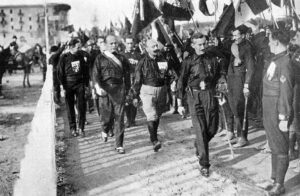
Martin Oppenheimer discusses the corporatist character of historical fascism and the importance of a left alternative vision to counter fascist threats today.

Martin Oppenheimer discusses the corporatist character of historical fascism and the importance of a left alternative vision to counter fascist threats today.

No matter how much times passes, or how often history is declared to have ended, the debate over socialist strategy and organization always returns.

Ada Colau of Barcelona en Comú (BComú) remains mayor of Barcelona thanks to the promise of a pact with the PSC (Partit dels Socialistes de Catalunya) whose content is not yet known but which will involve a distribution of power . . .

With a turnout of more than 75%, the PSOE (Partido Socialista Obrero Español – Spanish Socialist Workers’ Party) was the main winner (28.70% of votes, with 123 seats, as against 2016 when it obtained 85) against the PP (Partido Popular . . .

Barcelona has once again become a center of radical politics. After decades of brutal repression under Franco, the Left has returned and the city is alive with political activity. Of course, the Left of 2018 is not the same Left that controlled Barcelona during the first months of the Spanish Civil War.
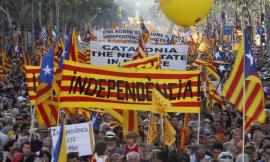
Dan La Botz, a co-editor of New Politics, interviewed Josep María Antentas, teacher of Sociology at the Universitat Autònoma de Barcelona (UAB) and anticapitalist activist.
DL: The Catalan independence movement and its suppression by the Spanish state have garnered the attention of the world. What has been your attitude toward the question of Catalonia?
JMA: My traditional position is the defense of the right to self-determination, with the idea that when a group wises to exercise this right its position must be made specific. In the current situation and since the independence movement began in 2012, the defense of a “Yes” vote has a more democratic content than the “No” vote, which is associated exclusively with the reactionary defense of the Constitution and the political regime.
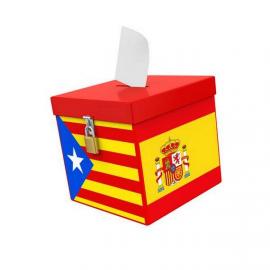
At the southern tip of Europe, stretching out its two hands of Ceuta and Melilla to reach Africa, Spain usually goes unnoticed. Our news hardly ever makes world headlines; it’s simply not impactful enough. Over the past month, however, my adopted homeland has been enveloped in one of the most controversial events of the decade, and finally our dirty laundry is being hung out to dry on the international clothesline. The threat of Catalonia breaking away from Spain is juicy. It’s the political equivalent of a marriage gone wrong, complete with steepled-finger scheming, mutual resentment, and fittingly, bouts of domestic violence. But it also serves to show how the choices and actions of politicians turn a prominent issue in need of discussion into a roiling turmoil. The question of Catalonian secession is the result of the thoughtless, petty political practice that is ubiquitous in governments around the world, but that should have no place in the future of governance.

When the 15-M movement broke out onto the streets across Spain in 2011, it didn’t coalesce into a series of political parties on either end of the political spectrum. In fact, there was a common declaration that stood out among all of the indignados: “They don’t represent us”.
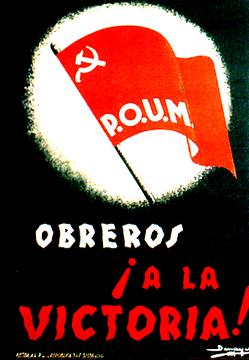
On 18 July 1936, part of the Spanish army, backed by the upper classes and the Catholic church, rose up with the intention of ending the country’s experiment in democracy and social reform (the Second Republic 1931-6). The resulting civil war would be one of the pivotal events of the 20th century. For some it was the rehearsal for the Second World War, for others the “last great cause”.
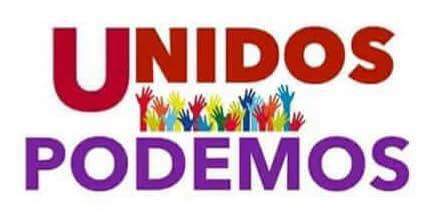
With abstention up by 4% from the last parliamentary elections in the Spanish state on December 20, 2016 (69.84% participation against 73.2%), the results of what we might call a “second round”, with the right wing Popular Party (PP) increasing its number of votes (600,000 extra votes and 33% of voters) and its number of seats to 137 (against 123 previously), and a Socialist Party (PSOE) which, despite losing 100,000 votes (22.7% of voters) and five seats, remains the second biggest political force in the country.

Podemos, meaning “We Can,” is one of the most exciting developments taking place on the left in Europe today. For years politics in Spain had been dominated by two parties: the conservative the People’s Party (Partido Popular or PP), headed by Mariano Rajoy, and the Socialist Workers Party of Spain (PSOE), led by Pedro Sánchez. But, in the last election held in December of 2015, the new left party Podemos won five million votes, fundamentally votes by the lower classes against the economic elites and their austerity plans. That represents 20% of the electorate, and 69 out of 350 seats in the house of deputies.[1]
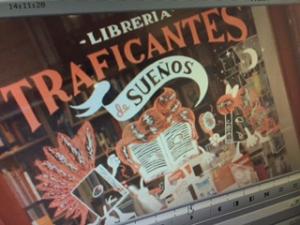
In Madrid to give a talk on American politics and the Bernie Sanders campaign at , I took time to meet and converse with some young organizers of Anticapitalistas and one longtime leader of the left who had to go into exile toward the end of the years of the Franco dictatorship.
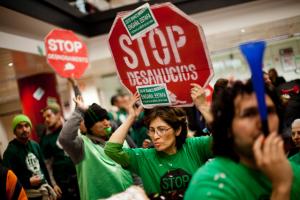
I spent a few days in Barcelona, meeting with older and younger activists, some of them former members of the Revolutionary Communist League (LCR), others younger activists in the group Anticapitalistas or in Procés Constituent. I also joined two protest demonstrations and gave a talk at the Ateneu Rebel for the journal Viento Sur for which I write. Here are my impressions, just impressions.
Agustín Guillamón is a dedicated anarcho-syndicalist activist whose partisanship has not affected his critical sensitivities nor prevented him from graphically outlining what he regards as the errors and inconsistencies of the Spanish libertarian left.
 The Indignados (in English, the “outraged”), protagonists of what is called the Spanish May 15, or 15M, Revolution (2011-2013), concentrated a great deal of their political action on the construction of a shared conceptual and emotional understanding of the political reality around them.
The Indignados (in English, the “outraged”), protagonists of what is called the Spanish May 15, or 15M, Revolution (2011-2013), concentrated a great deal of their political action on the construction of a shared conceptual and emotional understanding of the political reality around them.
In this article I will analyze the current situation of the Left in Spain, ahead of the forthcoming December 20, 2015 General Elections, by considering how four of its political actors (United Left, Podemos, The Municipalist Platforms and Anti-capitalist Left) have shaped their strategies and agendas in response to the political changes that the 15M Indignados movement brought about.
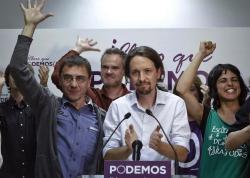
Podemos can still change Spain for the better. But it won’t do so by chasing the political center.
The strategic debate inside Podemos has become a public issue. Pablo Iglesias, the leader of the Spanish party, even recently jumped into the discussionwith an article explicitly inspired by Antonio Gramsci. But beyond the direct leadership of the party, the strategy debate involves something that pertains to everyone — to the scores of people and social sectors who desire a profound transformation of the Spanish political reality.
In the seventh century, Musa bin Nusair, born in Syria, traveled and fought his way through the Middle East and across North Africa, expanding the Muslim empire headquartered in Damascus, Syria. With his general Tariq bin Ziyad in the lead, he crossed the Mediterranean from Morocco with an army of several thousand, taking control of most of Spain. From 711 until 1031, the Umayyad Empire stretched from Córdoba to Damascus.